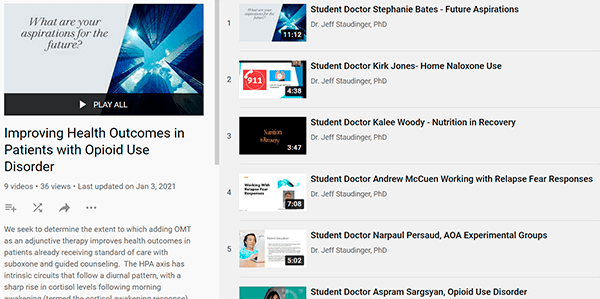Research Projects at KCU
For more information about research scholarship at KCU, please visit Digital Commons.
KCU College of Dental Medicine D-1 Student Presents Research on Score 1 for Health at the National Oral Health Conference
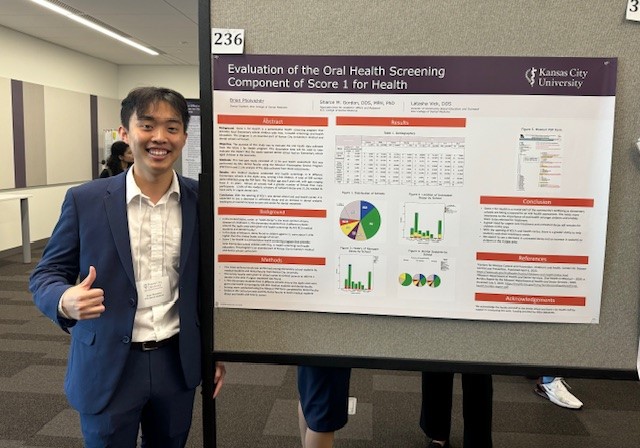
Under the guidance of faculty mentors Sharon Gordon, DDS, PhD, MPH and Latasha Vick, DDS, MHS, dental student Brian Pholvichitr (CDM ‘27) presented his project with Score 1 for Health at a poster session during the National Oral Health Conference in St. Louis, Mo.
KCU's Score 1 for Health, a preventive health program that provides free, in-school health screenings for elementary-aged children, is an essential part of KCU’s medical and dental school curriculum.
The purpose of this study was to evaluate the oral health data collected during Score 1 for Health screenings. During the 2023-24 academic year, more than 400 medical students conducted oral health screenings for eight different elementary schools in the Joplin area, serving 1716 children. Of those students screened, 13.6 percent had a history of rampant decay and 21.2 percent needed to have early or urgent dental care.
This descriptive data will be used as a benchmark to evaluate the impact of the newly opened KCU College of Dental Medicine and Oral Health Center on the oral health status of elementary-aged children in the Joplin area. It is expected to see a decrease in untreated decay and an increase in dental sealants, resulting in an overall increase to care and access for dental treatment.
The Intersection of Medicine and Creativity: KCU Student Collaborates with Stanford University in Developing a Novel Device
_20231215165644_0.png) “The true sign of intelligence is not knowledge, but imagination.” This quote, attributed to Albert Einstein, epitomizes Donald Keating and his desire to balance the demands of his studies with his passion for innovation and creativity. Read the full story by clicking here.
“The true sign of intelligence is not knowledge, but imagination.” This quote, attributed to Albert Einstein, epitomizes Donald Keating and his desire to balance the demands of his studies with his passion for innovation and creativity. Read the full story by clicking here.
KCU 4th Year Student Co-Authors Yale Study That Shows Promise in Treating Sarcoidosis
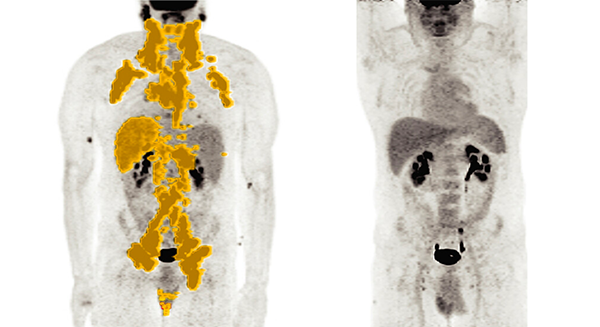 In a clinical trial, a Yale team treated 10 sarcoidosis patients with tofacitinib, a Janus kinase (JAK) inhibitor normally used to treat rheumatoid arthritis and other autoimmune diseases. The study of the trial and results was published on June 6, 2022. KCU-Joplin alumnus Abigale Clark was an additional co-author of the study. Treating sarcoidosis with JAK inhibitor shows promise in clinical trial
In a clinical trial, a Yale team treated 10 sarcoidosis patients with tofacitinib, a Janus kinase (JAK) inhibitor normally used to treat rheumatoid arthritis and other autoimmune diseases. The study of the trial and results was published on June 6, 2022. KCU-Joplin alumnus Abigale Clark was an additional co-author of the study. Treating sarcoidosis with JAK inhibitor shows promise in clinical trial
KCU Research Team Publish Peer-Reviewed Observational Study Comparing Outcomes of Sepsis Patients
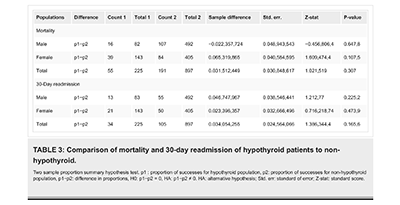 A Kansas City University research team led by Robert Arnce, MD, assistant professor of Emergency Medicine, recently completed and published a retrospective observational study evaluating how the presence of hypothyroidism affects outcomes in septic patients.
A Kansas City University research team led by Robert Arnce, MD, assistant professor of Emergency Medicine, recently completed and published a retrospective observational study evaluating how the presence of hypothyroidism affects outcomes in septic patients.
The study, published on Cureus.com in February 2022, Outcome Comparisons Between Septic Patients With and Without Secondary Diagnosis of Hypothyroidism From a Rural Midwest Hospital, provides details of sepsis morbidity and mortality rates, which have remained high despite recent developments in clinical guidelines aimed to curtail this disease process. Understanding how sepsis interacts with co-morbidities and pre-existing disease states is necessary for improving sepsis treatment. Accounting for specific pre-existing conditions in the treatment of sepsis patients may not only improve patient outcomes but also reduce health-care costs by preventing possible complications.
Cureus.com, based in San Francisco, California, is an open-access medical journal whose mission is to leverage the power of the internet through a crowdsourced community platform to share and promote published medical knowledge.
KCU Faculty and Student Doctors Invited to Review Literature in the Field of Nuclear Receptor Research
 Published November 2021 in Cells, a peer-reviewed journal, this invited review of the ligand-activated nuclear receptor superfamily member Pregnane X Receptor (PXR, NR1I2) was completed by a team of MKRC & KCU staff. The team included KCU faculty members Dr. Robert Rogers and Dr. Jeff Staudinger as well as eleven (11) student doctors, and the review is published in the Cells special themed issue Current Trends in pregnane X receptor Research. Read the review here: The Interface between Cell Signaling Pathways and Pregnane X Receptor.
Published November 2021 in Cells, a peer-reviewed journal, this invited review of the ligand-activated nuclear receptor superfamily member Pregnane X Receptor (PXR, NR1I2) was completed by a team of MKRC & KCU staff. The team included KCU faculty members Dr. Robert Rogers and Dr. Jeff Staudinger as well as eleven (11) student doctors, and the review is published in the Cells special themed issue Current Trends in pregnane X receptor Research. Read the review here: The Interface between Cell Signaling Pathways and Pregnane X Receptor.
The review opportunity allowed the KCU faculty and student doctors to form a cohesive team and expand their scientific knowledge about nuclear receptor signaling in pathological disease states. The exercise also gave a number of KCU student doctors the rigorous experience of writing and editing an invited review article and first-hand experience of the effort it takes to publish in a scientific peer-reviewed journal.
Congratulations to the KCU team for this invited review of recent literature! The peer-reviewed journal Cells also published an earlier KCU team's study in nuclear receptor research in their special October 2020 issue (see info below).
 KCU Student Doctors' Research Published in Internationally Renowned Journal
KCU Student Doctors' Research Published in Internationally Renowned Journal
Published October 2021 in Biomedicines MDPI, an internationally renowned journal, with an impact factor of six, Andrew Sulaiman, PhD, assembled and led a research team of KCU student doctors including Rohith Kandunuri, Vishak Vinod and Sai Chilumula. They reviewed TGF-β signaling and its importance in patient prognosis for those diagnosed with triple-negative breast cancer.
“This article reviewed TGF-β signaling and its importance in breast cancer patient prognosis. Additionally, we stratified a database of 1083 breast cancer patients and found that the TGF-β was specifically upregulated in triple-negative breast cancer patients and its expression was associated with substantially reduced patient outcomes,” he explained. “This is important as right now, there are no specific therapies for the treatment of triple-negative breast cancer patients. Identification of TGF-β as a potential target for this disease may lead to novel therapeutic approaches. We further highlighted preclinical and clinical trials using TGF-β inhibitors for further investigation.” View the published research: Clinically Translatable Approaches of Inhibiting TGF-β to Target Cancer Stem Cells in TNBC.
KCU Faculty and Students Publish Research and Development for Sterilization and Sanitizing of 3D-printed PPE
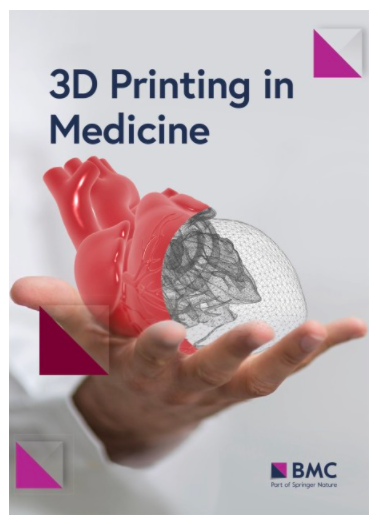 When the COVID-19 pandemic exposed serious deficiencies in the national supply of PPE, Kansas City University faculty and students faced the challenge with ingenuity. In collaboration with Missouri Southern State University and Nemotech 3D Printing, LLC, Drs. Jeff Staudinger and Brad Creamer led research together with KCU College of Medicine students to create a 3D-printed N95-like mask using a polypropylene starting material. The results of their study proved that 3D-printed polypropylene is effectively sterilized in an autoclave, and can also be effectively sanitized with household cleaners such as bleach or hydrogen peroxide, and can thus be re-used.
When the COVID-19 pandemic exposed serious deficiencies in the national supply of PPE, Kansas City University faculty and students faced the challenge with ingenuity. In collaboration with Missouri Southern State University and Nemotech 3D Printing, LLC, Drs. Jeff Staudinger and Brad Creamer led research together with KCU College of Medicine students to create a 3D-printed N95-like mask using a polypropylene starting material. The results of their study proved that 3D-printed polypropylene is effectively sterilized in an autoclave, and can also be effectively sanitized with household cleaners such as bleach or hydrogen peroxide, and can thus be re-used.
Results of their research have the potential to support health care workers needs for PPE in the event of another pandemic, and could help mitigate the copious amount of medical waste brought about by single-use paper masks. Additionally, the versatile nature of polypropylene starting material has the potential for use in the manufacture of other medical devices that are now single use, or are in short supply during a pandemic should they be needed in the future.
Their work was published on June 11, 2021, in BioMed Central - 3D Printing in Medicine.
An Analysis of Anatomy Education Before and During COVID- 19:
May-August 2020
Jennifer Dennis-Winslow, PhD, associate professor in KCU’s Department of Anatomy, worked with multiple colleagues and members within their professional organization, the American Association for Anatomy (AAA). The team developed a study that evaluated immediate changes (March-May) in Anatomy education across the United States in response to the Covid-19 pandemic. They are currently working on Part 2 of this study to evaluate changes implemented from June-Dec. Read the study, published online December 30, 2020.
KCU-Joplin Faculty and Students Publish Research on YouTube
KCU professor of pharmacology and chair of basic sciences Dr. Jeff Staudinger promotes KCU-Joplin student research work on his YouTube channel. His students work on research projects that can provide greater context for, or help inform, current health care scenarios in our country or around the globe. The most recent playlist on Dr. Staudinger's channel tackles opioid use: Improving Health Outcomes in Patients with Opioid Use Disorder.
KCU Professor and Researcher Collaborates on Study of New Protein Marker in Dementia
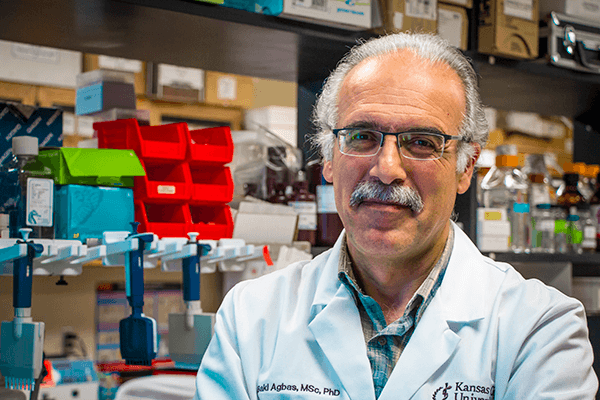 As the world of science looks for cures in the battle against dementia, researchers have identified a new enemy. A newly-named pathway to dementia that has always existed, but now has a name: Limbic-predominant Age-related TDP-43 Encephalopathy, or LATE. Kansas City University professor and researcher Abdulbaki Agbas, MSc, PhD, is part of the urgent quest to study and learn more about this pathway and disease. Read more...
As the world of science looks for cures in the battle against dementia, researchers have identified a new enemy. A newly-named pathway to dementia that has always existed, but now has a name: Limbic-predominant Age-related TDP-43 Encephalopathy, or LATE. Kansas City University professor and researcher Abdulbaki Agbas, MSc, PhD, is part of the urgent quest to study and learn more about this pathway and disease. Read more...
KCU Faculty and Medical Students’ Work Published Alongside Other Leaders in the Field of Nuclear Receptor Research
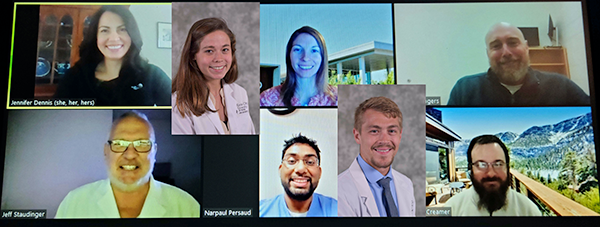 October 2020 - Congratulations to researchers at KCU-Joplin, on the publication of a peer-reviewed article titled “Associations between Pregnane X Receptor and Breast Cancer Growth and Progression.”
October 2020 - Congratulations to researchers at KCU-Joplin, on the publication of a peer-reviewed article titled “Associations between Pregnane X Receptor and Breast Cancer Growth and Progression.”
The team led by Jeffery Staudinger, PhD, and Bradley Creamer, PhD and composed of KCU-Joplin researchers and medical students was invited to contribute to a special theme issue of the journal, Cells, an international peer-reviewed open access journal of cell biology, molecular biology, and biophysics. The special issue is titled "The Xenobiotic Receptors CAR and PXR in Health and Disease."
“It is an honor to have our manuscript published in this special issue and to have our work appear with other articles contributed from absolute leaders in this field,” said Staudinger.
KCU Professor Developing Innovative Test for Early Diagnosis of Neurodegenerative Disease
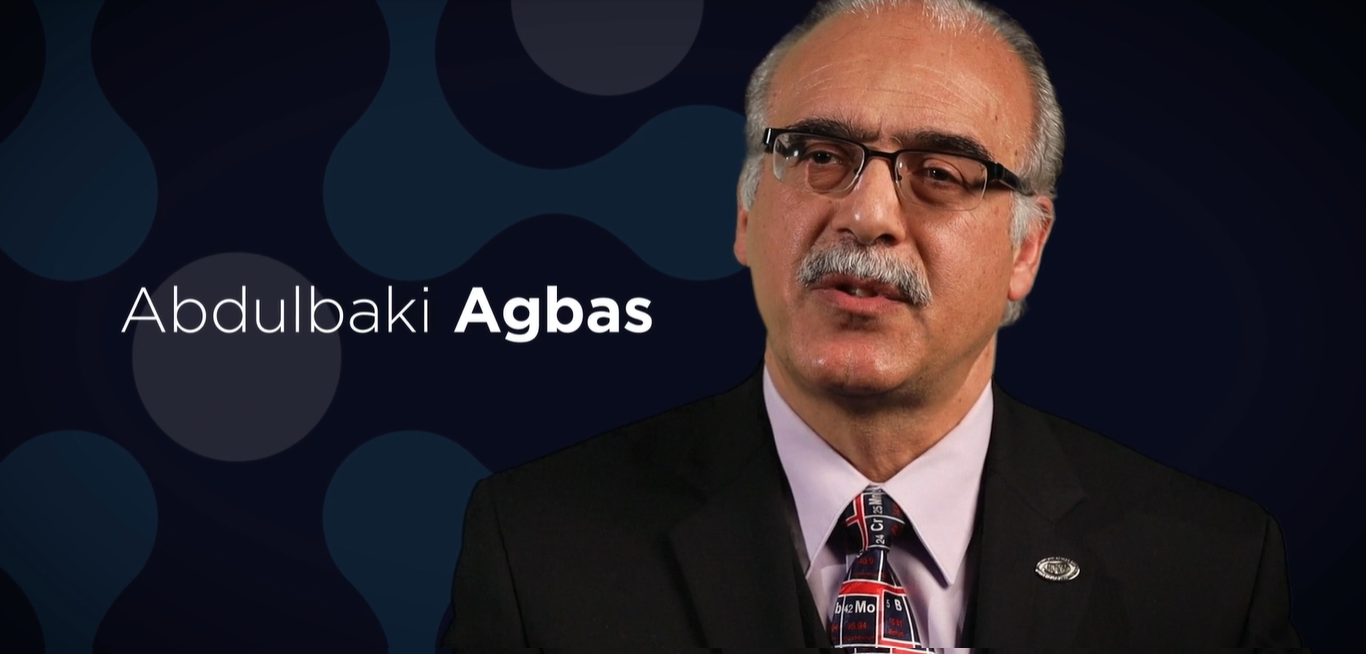 August 14, 2020 - Dr. Abdulbaki Agbas, professor and director of research at Kansas City University, is working to develop a blood-based biomarker that diagnoses Alzheimers disease and ALS before their clinical manifestations. Read about Dr. Agbas' research on the BioNexusKC site
August 14, 2020 - Dr. Abdulbaki Agbas, professor and director of research at Kansas City University, is working to develop a blood-based biomarker that diagnoses Alzheimers disease and ALS before their clinical manifestations. Read about Dr. Agbas' research on the BioNexusKC site
Second-Year KCU Student's Research Published for Advances in Triple Negative Breast Cancer Treatment
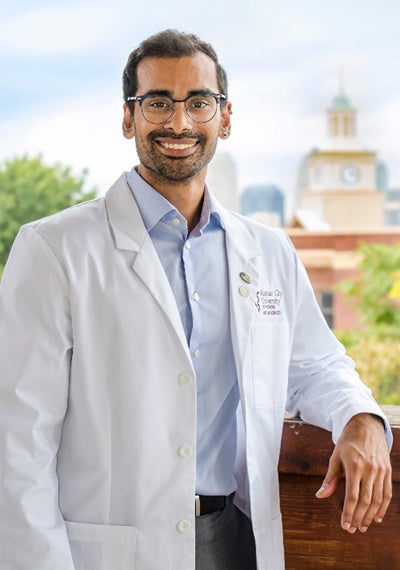 August 12, 2020 - Second-year med student Andrew Sulaiman, PhD, is a published first author in two new research papers in the International Journal of Molecular Sciences and in Advanced Therapeutics where he focuses on triple negative breast cancer (TNBC).
August 12, 2020 - Second-year med student Andrew Sulaiman, PhD, is a published first author in two new research papers in the International Journal of Molecular Sciences and in Advanced Therapeutics where he focuses on triple negative breast cancer (TNBC).
Through development of a combinational therapy, they improved cisplatin's TNBC targeting abilities while stopping cancer stem cell enrichment and resistance. His research findings may make cisplatin usage for TNBC more translatable in the clinic setting.
In the second publication, when the nanoparticle encapsulated therapy was compared to conventional chemotherapy, it proved better anti-tumor targeting effects and reduced rates of relapse and tumorigenicity after treatment, making this research an advancement in TNBC.
